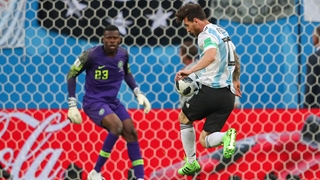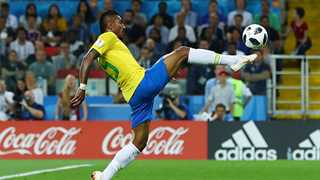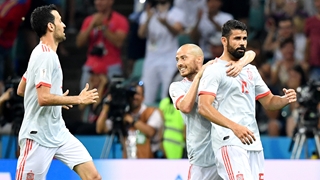
Runs behind the opposition
Lionel Messi’s exquisite opening goal for Argentina against Nigeria has deservedly been decorated in acclaim for much of the last week.
Given the quality of the execution, it can, however, be forgotten as to how the Argentinian captain ended up with the chance at goal in the first place.
Sensing the opportunity of a forward pass, half a step towards the ball was all it took for Messi to tempt Nigerian defender Kenneth Omeruo from the security of his backline.
With defensive organisation disrupted – and opposition eyes on the ball, not the man - Messi was free to dart into the space behind to receive a telepathic forward pass from Ever Banega (see below).
With many teams struggling to find creative ways through compact defences, Messi’s goal underlined the reward on offer for teams willing to combine intelligent forward running with passes beyond the opposition.
Paulinho’s opening goal for Brazil in their 2-0 victory over Serbia may not have been delivered with Messi’s stardust, but it was a goal of equally impressive merit.
The Brazilian’s ghosting run from a deep midfield position - difficult for markers to track- was a masterclass in timing, anticipation and movement.
Accurate passes from deep
The goals scored by both Messi and Paulinho were only made possible by the wonderfully weighted passes delivered by Banega (Argentina v Nigeria) and Philippe Coutinho (Brazil v Serbia).
Not only were the passes delivered with accuracy, timing and perfect backlift, but also with an element of disguise and surprise.
With predictable passing in front of the opposition common in many games, defences can be disarmed by midfield players who can disguise the intention and direction of their pass until the very last moment.
Those who can locate the runs of attackers between and beyond the opposition are in the minority at this tournament, but those who can should be given a starring role as the tournament progresses.
Delivering forward passes comes with an element of risk, but it may ultimately bring reward.
The importance of transition
As the tournament moves into the knockout stage, caution may be replaced by necessary adventure as teams gamble in search of victory.
With greater numbers committed to attack – particularly towards the end of games - how moments of attacking and defensive transition are managed will play a key part in deciding outcomes.
Mexico have shown how swift and efficient counter-attacking play utilising overload situations can prove successful. In these moments, decision-making is key and teamwork rewarded ahead of individuality.
Protecting against the counter-attack will be just as important. With the majority of teams deploying full-backs in advanced positions, security in front of the backline continues to be a key area when possession is conceded.
Defensive midfield players - such as Casemiro (Brazil), N’Golo Kante (France), William Carvalho (Portugal) and Carlos Sanchez (Colombia) - who can fill spaces in the backline and provide cover in wide areas will be crucial as games open up and spaces for attacks appear.
Germany’s lack of protection in this area, should serve as a warning to all.
Defensive control around the penalty area
With set pieces and penalties (discussed in more detail here) continuing to make a significant contribution to the narrative of the tournament, Gareth Southgate’s comments in the lead up to England’s game with Belgium could prove significant.
The Three Lions’ boss explained how he and his backroom staff have studied the set-piece routines of other successful countries and highlighted a link between those who concede the fewest free-kicks in their own half and progression to the latter stages in tournaments.
With many teams profiting from well-rehearsed set piece routines, those who minimise the opportunities for set-plays against could profit.
Longer-term, the development of defenders who concede fewer fouls and instead anticipate and intercept, rather than confront opponents physically, will be of huge value in international football.
Unlikely overloads
For many, the identity of Argentina’s match-winning goalscorer against Nigeria brought much surprise. However, Marcos Rojo’s late volley could well be an indication of how games will be decided as the tournament progresses.
With defences well prepared in dealing with common attacking threats, an unexpected presence on the frontline can make the difference - as the Manchester United defender proved.
A signature of Russia’s progression from the group stage has been the forward runs of attacking right-back, Mario Fernandes. The CSKA Moscow defender has made a number of underlapping runs into the penalty area to provide an unexpected threat.
There shouldn’t be any surprise if a crucial goal in the coming weeks comes from an unlikely source.
Fancy being a coach yourself? Find out everything you need to know on how to get started.











